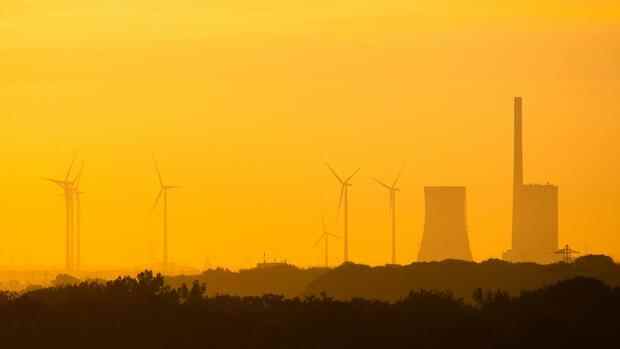According to the study, there is a lack of reliably deployable power plant capacities that take on a back-up function when the wind is not blowing and the sun is not shining.
(Photo: dpa)
Berlin The view of the German energy transition has changed in recent years. Considerable skepticism is giving way to growing approval. That is the core result of a global survey that the World Energy Council Germany presented on Monday.
While in 2011 19 percent of those surveyed still believed that German energy policy could be a blueprint for the world, according to the latest survey it is now 28 percent. 54 percent of those surveyed consider the German energy transition to be at least partially exemplary. Among people under 35 years of age, 50 percent see the German energy transition as a kind of role model for the world. The World Energy Council sees itself as a cross-energy network of the energy industry and is represented in almost 100 countries.
However, there are also downsides in the perception of the German energy transition: According to the survey, respondents see the greatest risk with the issue of energy security. Here, 36 percent of those surveyed expect the energy transition to have a negative impact.
“The transformation of our energy system naturally involves risks,” said Carsten Rolle, Managing Director of the World Energy Council Germany. The security of supply in Germany is still high, and power outages are rare. “But nuclear and coal-fired power plants will be switched off, while the demand for electricity is increasing due to increasing electrification and the expansion of renewables and gas-fired power plants is stalling,” said Rolle. “The question marks from abroad are not unjustified,” he added.
Top jobs of the day
Find the best jobs now and
be notified by email.
Rolle is touching a sensitive point in the energy policy debate. Securing a supply of electricity every second of the year is likely to be one of the major challenges of the years to come.
There is a lack of power plant capacities
With a dwindling proportion of secured output from coal and nuclear power plants and an increasing proportion of volatile generation from renewable sources, gaps are opening up. There is a lack of reliably deployable power plant capacities that take on a back-up function when the wind is not blowing and the sun is not shining.
In the past few weeks, various studies have come to the conclusion that considerable new gas-fired power plant capacities will have to be created in Germany by 2030. However, investors who want to build such power plants are not in sight.
Rolle also highlights the uncertainties involved in building trading partnerships in the green hydrogen field. “We will not be able to electrify all areas of the energy system, especially not in the industrial and transport sectors. We will therefore have to import energy carriers based on CO2-free hydrogen, ”he said.
After all, 93 percent of those surveyed see potential for the necessary cooperation between Germany and other countries in the field of green hydrogen.
More: The 860 billion euro plan for Germany’s energy transition
